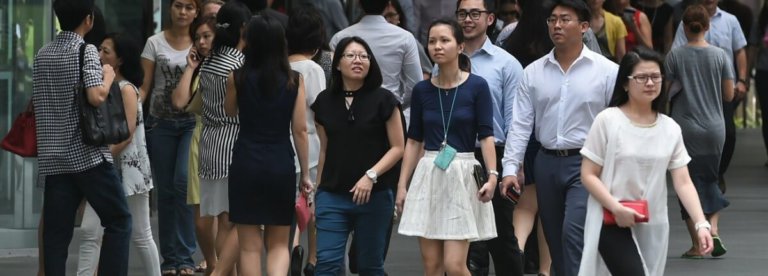
As a tiger economy and one that’s embarking on a Smart Nation agenda to prepare the country for the Fourth Industrial Revolution, Singapore usually ranks high up in the list of top nations for study and work.
A big part of its popularity among international students and professional migrants is the high salaries and quality of life it offers. The monthly median income for Singaporean workers stood at S$4,437 in 2018, while for fresh graduates it’s S$3,500, according to government data.
Since 1980, the Southeast Asian nation’s GDP per capita has grown exponentially. In 2018, its GDP per capita stood at US$64,581.94, higher than Australia’s at US$57,305.3 and nearly six times more than East Asia and the Pacific’s at US$11,132.32.
In the latest edition of HSBC’s annual ranking of best places in the world for expats to live and work, Singapore is the only Asian city state that ranks in the top three. HSBC assessed quality of life, competitive salaries and stunning surroundings, seeing Switzerland vault to the top from eighth place last year.
Data shows that it could be a lucrative move to study in Singapore and make the transition into employment. But it takes more than just a plane ticket and an offer of admission to the island nation’s higher education institutions to rake in the big bucks.
The course you choose makes a significant difference to how much you stand to earn as a fresh graduate. In Singapore, the best choice of university course may be less obvious than you might think.
According to a joint survey by the National University of Singapore, Nanyang Technological University, Singapore Institute of Technology, Singapore Management University, Singapore University of Social Sciences and Singapore University of Technology and Design, these are the courses that brought in the highest salaries for fresh graduates in 2018:
| Course | Gross Monthly Median Salary (S$)* |
|---|---|
| Law | 5,000 |
| Dentistry | 4,050 |
| Information & Digital Technologies |
4,022 |
| Architecture | 4,000 |
| Education | 3,800 |
| Pharmacy | 3,650 |
| Engineering | 3,600 |
| Health Sciences | 3,450 |
| Business | 3,400 |
| Built Environment | 3,400 |
* Gross monthly salary pertains only to full-time permanently employed graduates. It comprises basic salary, overtime payments, commissions, fixed allowances and other regular cash payments, before deductions of the employee’s Central Provident Fund (CPF) contributions and personal income tax. Employer’s CPF contributions, bonuses, stock options, lump sum payments, and payments-in-kind are excluded.
Graduates were surveyed approximately six months after completing their final examinations last year.
While computer science and engineering graduates hog the limelight in our technology-dominated world, it’s the holders of a Bachelor of Laws degrees that earn the most. The figure obtained for law graduates comes after they have completed their one-year practical law course or pupillage.
The other non-STEM (science, technology, engineering and mathematics) degrees in the top 10 list are Education and Business, defying the conventional wisdom that only STEM degrees command the highest earnings.
Music graduates recorded the sharpest decline, from S$3,250 in 2016 to S$1,800, the lowest amount among all courses in 2018.
Liked this? Then you’ll love…
Does the type of business degree you get determine your salary?
Australia: Employers pay most international students half of legal min wage – report







